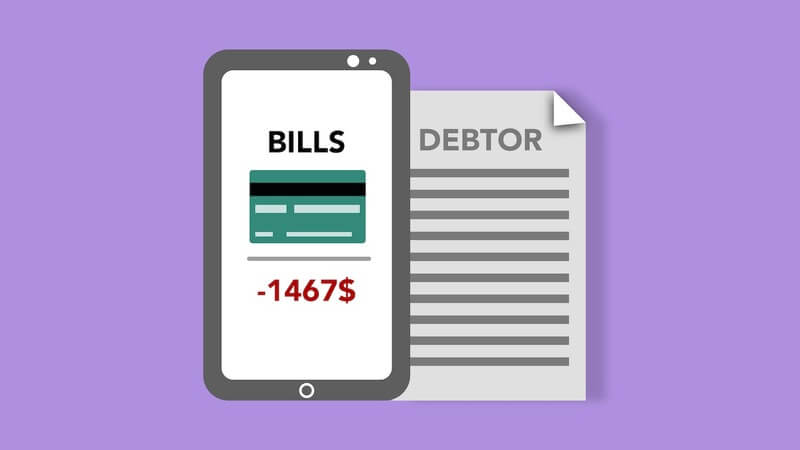How To Tell If A Debt Collector Is Legit or Scam?

Credit: Karolina Grabowska
I’ve only been contacted by a debt collector once. It was terrifying.
They didn’t threaten me or anything – I’m just a lightweight and do not like being called out for breaking the rules.
In this case, it was an apartment I’d rented for a year or two a couple of years earlier. I’d moved out and was surprised they returned my security deposit. Apartments tend to find some excuse to keep it, in my experience.
Sure enough, they’d been trying to reach me about “damage” they’d found to the apartment. Never mind that I was hardly ever there, I owned no pets, and I’d made a point to clean it thoroughly.
Their attempts to track me down to collect this debt had been unsuccessful. So they’d turned it over to collections.
Of course, since so much time had passed, it would be tough to prove the damages existed. And it was way too late to require a list of costs to repair. All I could do was pay what they said I owed and move on.
And that’s why I’ll never rent an apartment again.
Was I scammed? Not by the debt collector. Looking back, I didn’t take all the measures I should have to confirm the debt. Knowing our rights can make a big difference.
What Are Debt Collector Scams?

Credit: Karolina Grabowska
Bills. We all have them. We all pay them.
If we don’t, the creditor doesn’t just toss the invoice in the trash and pretend it never existed. Instead, the late notices will start arriving.
If you still don’t pay those, the creditor will likely turn it over to a debt collector. And that debt collector has one job:
Get you to pay.
Here’s how collections work:
Having a collections entry (sometimes called a “charge off”) on your credit report will negatively impact your score. It will also show up to any lenders who check your credit. That means you could spend seven years recovering from this one collection effort.
✎ Related: How to Spot a Fake Medical or Hospital Bill ➔
Types of Debt Collection Scams
1. Debt Collector Impersonation Scams
What is it? Someone contacts you, claiming to be a debt collector. This person has information about the debt that may be vague enough that it seems realistic. It could be a debt from so long ago, you wouldn’t have remembered it anyway. The caller pushes you to pay, possibly even using threatening language.
How to spot it: Fake debt collectors can be very convincing, but the bottom line is you should be clear on the debt. If the caller refuses to give details or even tries to dig information out of you, see it as a red flag.
How to avoid it: Laws are in place to protect consumers, and legitimate debt collectors follow those laws closely. Under the Fair Debt Collection Practices Act, collectors aren’t to use harassment or threatening language to coerce payment out of consumers. The debt collector is required to tell you the name of the creditor, the amount owed, and the method to dispute it. If the debt collector can’t provide this information immediately, it’s required that it be sent in writing within five days.
2. Law Enforcement Impersonation Scams
What is it? In some cases, you get that call from someone claiming to be law enforcement. The person might pretend to be a sheriff, deputy, or an IRS official. Fraudsters might even show up at homes in uniforms, claiming to be law enforcement collecting a debt. You’re urged to pay the debt immediately to avoid jail.
How to spot it: A late bill isn’t going to have law enforcement calling you or even visiting your home. If a creditor sues you and you ignore a court summons, that could lead to an arrest, but it won’t be couched as debt collection. Law enforcement also doesn’t collect money from citizens on behalf of debt collection companies or businesses filing lawsuits.
How to avoid it: Demand the name of the debt collection agency the caller is representing, as well as contact information. If someone has shown up at your door saying they’re law enforcement collecting on a debt, contact the police. It’s illegal to impersonate a police officer.
3. Extortion Scams
What is it? Humiliation is the name of this game. Scammers threaten you with exposure if you don’t pay up. They say they’ll inform your employer, friends, and associates…or maybe they’ll blast it out across social media. This scam is designed to make you believe you could face reputation damage if you don’t take action.
How to spot it: A legitimate debt collector won’t threaten to share details about your debt with the mass public, your employers, or anyone else. The Fair Debt Collection Practices Act specifically states that debt collectors can’t communicate about your debt with anyone but you, your attorney, a consumer reporting agency, the creditor and its attorneys, or the debt collector’s attorney.
How to avoid it: If any debt collector is using threatening language, see it as a red flag and disengage. Ask for information about the debt in writing, and if it arrives, investigate before forwarding any money.
4. Phantom Debt Scams
What is it? This scam is similar to debt collection impersonator scams, only in this case, the debt itself isn’t real. The debt collector may refer to a nonexistent debt or one that has already been discharged. In some cases, the debt is real, but the amount cited is artificially inflated.
How to spot it: It can be tough to remember every single debt you’ve ever owed, but if something seems even somewhat unfamiliar, it’s worth looking into. If you’re being scammed, the collector will dodge questions and try to avoid giving details about the debt despite it being required by law. Scammers will also be dead set on getting you to pay, even pushing past your questions to try to coerce you into providing payment information.
How to avoid it: Gather as much data as possible, along with a name and phone number to call back. Then gather a copy of your credit report and try to match the stated debt with one of the entries there. If possible, contact the original creditor and see if they can verify that the amount was turned over to collections.
5. Debt Repair Scams
What is it? There’s no shortage of companies promising to repair your credit. With this scam, someone targets those who have accounts in collections, promising to fix the situation for a fee. The scammer might even claim to be able to erase collections and other bad entries from your credit report. Unfortunately, these promises never lead to results.
How to spot it: Fake collection repair experts will promise the moon to get you to sign on. But even legitimate debt repair companies can’t remove valid entries from your credit report. If there are inaccuracies, a repair company can help you dispute them, but you can do that on your own.
How to avoid it: Debt repair companies are, in general, a bad idea, scam or not. You can remove inaccurate entries on your report by requesting your free credit report at AnnualCreditReport.com and highlighting all inaccuracies. Then reach out to each credit bureau using its dispute process. Nobody but the credit bureau itself has the authority to remove entries from your credit report.
6. Phishing Scams
What is it? Phishing is a common thread across many scam types. With debt collection, someone messages or emails, claiming to be collecting on a past-due bill. The language is typically urgent or threatening to encourage you to take action. When you click on the link to pay or learn more about the bill, you’re prompted to input information that can be used for fraud, such as credit card or bank account information, a Social Security number, a birthdate, or usernames and passwords.
How to spot it: Debt collectors typically operate by phone, not email or messaging. If someone reaches out to you that way, it’s the first sign it may be a scam. Vague language and a lack of details about the debt are also signs. You shouldn’t have to go to a separate site to get information about a debt someone’s trying to collect.
How to avoid it: Never click on links in emails from unfamiliar sources. If you have reason to suspect the debt might be legitimate, reach out to the original creditor and ask if any unpaid bills might have gone to collections.
Keeping Debt Collection Scams Away
Hopefully, you’ll never get a call from a debt collector, but if that ever happens, there are some things you can do to make sure the person is legit. Here are some ways to keep debt collection scams at bay.
1. Know Your Rights
The bad news for scammers (and legitimate debt collectors) is that laws exist to protect us, the consumers.
You can find those laws under the Fair Debt Collection Practices Act.
It’s an involved list of rules, but here’s what you need to know to protect yourself:
A debt collector must state:
If the debt collector can’t provide that information, it must be provided in writing within five days.
If you question the name of the creditor, and the debt collector can provide a corrected name, this has to be sent to you, in writing, within 30 days.
If you choose to dispute the debt, the debt collector has to stop collection processes until that debt collector can provide proof of the debt to you.
In other words, unless you’re sure the debt is legit, dispute the claim and wait. If you receive written verification of the debt, you can then research it to make sure the verification source is legit.
2. Track Your Finances
Being aware of your debts can help you quickly separate scams from legitimate collection efforts. That doesn’t mean you have to keep a spreadsheet of every charge you make.
What does it mean, then?
If you do have an unpaid debt that you think might go to collections, make a note of it. Keep it on a spreadsheet or in the notes file on your phone. When you do get a call, you’ll be prepared to match the information the caller is providing with your notes.
Also, save those late notices from creditors.
Yes, I know it’s painful. I want to burn things like that, too. But having them on file can make a big difference when it’s time to match what someone says you owe to what you actually owe (or don’t).
But even if you track your debts, old bills can creep up on you. That’s where the next tip can come in handy.
3. Keep an Eye on Your Credit Report
Long before your debt goes into collections, the creditor SHOULD HAVE BEEN TRYING to get the money from you.
In my case, I’d moved, so the creditor likely tried but failed. I’m guessing since it was a large property management company, they simply shifted it over to collections with all the other unpaid bills.
There’s no “rule” on how long a creditor will wait, but my research indicates six months is a reasonable assumption.
Creditors have the power to report your late payments to collections just as debt collectors do, though. And that means before a debt collector comes calling, you probably had a negative entry on your credit report.
Have you pulled your free annual credit report this year?
If not, go here and grab a copy from ALL THREE CREDIT BUREAUS. Review it for any late payments. If you’ve already gotten a call from a debt collector, does anything on the report match?
Maybe there’s a late payment that seems right, but the business name is off. In that case, you can require the collector to verify the name and amount owed in writing. If it still doesn’t match, you can contact the original creditor and ask if they file collections under another name.
If you can’t track down the debt, dispute the claim and wait. A legitimate debt collector will be able to provide written documentation of your debt.
✎ Related: How To Dispute Hard Inquiries? ➔
What to Do When the Scammer Wins?

Credit: Monstera
I didn’t verify the debt when my collector called.
I’m embarrassed to say I was intimidated into paying it.
It never showed up on my credit report, and my identity stayed safe.
But what if I hadn’t been so lucky? And what if you think you’ve been scammed by someone claiming to be a debt collector?
Here are some steps to reduce the damage and keep yourself safe.
1. Dispute the Charge
If you can prove the debt collection was a scam, take a look at how you paid. Is it reversible?
Credit card charges can be disputed. If you paid by gift card or wire transfer, though, you may be out of luck.
Either way, consider any information you might have given the scammer. If you input your credit card information into a website or pay by check, the scammer might have everything they need to take even more money.
Next, consider other information you might have given a scammer during the process and proceed to the next step.
2. Report the Scam
If someone has scammed you, debt collection or otherwise, the FEDERAL TRADE COMMISSION wants to know about it.
You can report scams or abusive practices related to debt collection at ReportFraud.ftc.gov.
The FTC reports this activity to law enforcement, so it’s a great way to potentially stop future fraud.
3. Consider Identity Theft Protection
At this point, you may be wondering how the scammer got your information.
You may not be able to solve that mystery, but at this point, it’s important to recognize that compromising data may be in the wrong hands.
Identity theft protection can help. Services like Aura, IdentityForce, and LifeLock can cover some of the costs of recovering if you do suffer from identity theft.
Additionally, these services can keep an eye on things and alert you if fraud is detected.
Whether you go this route or not, it’s a great idea to keep an eye on your credit report and bank accounts for a while to quickly identify when your identity may be at risk.
Conclusion
Scam or not, debt collection can be a tricky experience. Make sure you know your rights as a consumer so that you can quickly identify when a debt collector’s actions may be in violation.
✎ Read on to discover the related financial scams you need to be aware of:



